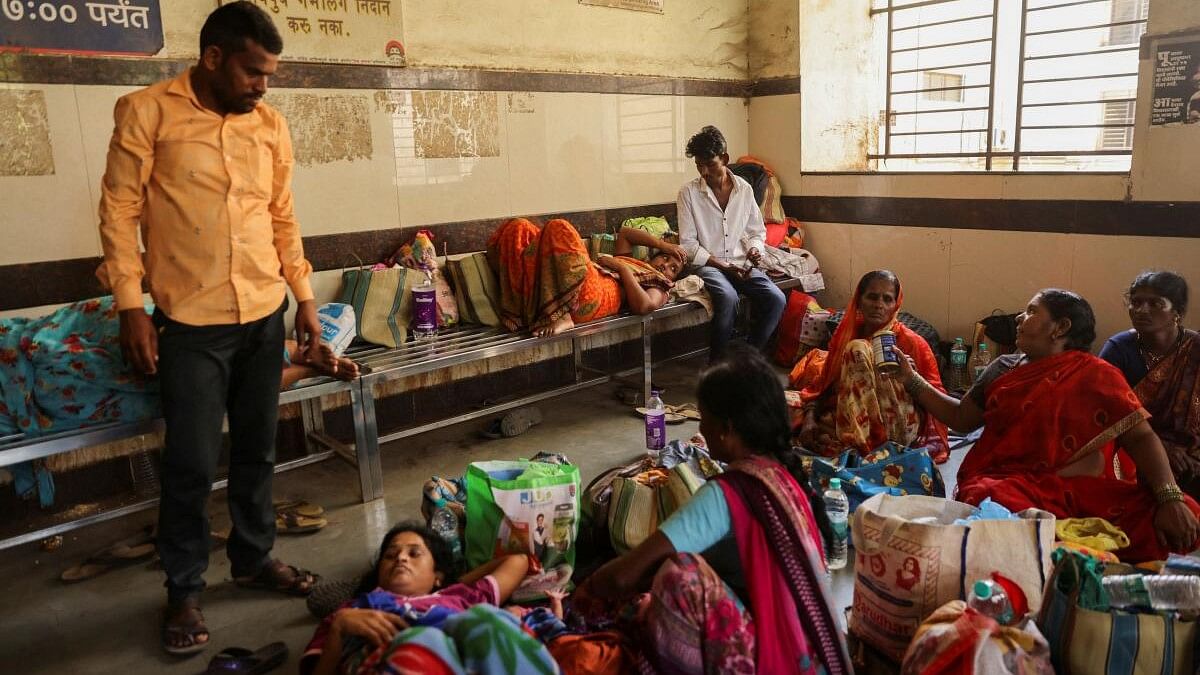
Relatives of patients admitted at the Shankarrao Chavan Government Medical College and Hospital are seen inside the hospital, in Nanded, October 3, 2023.
Credit: Reuters Photo
New Delhi: Cramming two-three babies on a single cradle at the neonatal intensive care units, having only a handful of doctors, nurses and sanitation staff per shift in violation of the regulatory norms and poor supply of medicines for the last four months are among the reasons for spiralling of deaths in a government hospital at Nanded that hit the headline earlier this month for 24 deaths in 24 hours including 11 babies.
This is among the findings of an independent panel of public health campaigners and doctors who visited government hospitals at Nanded to make a report that not only flags the health system failures but also shows how the Ayushman Bharat-PMJAY scheme made little impact in this southern Maharashtra district.
Because of poor paediatric care facilities in government healthcare sector in Nanded and nearby areas, most sick newborns approaching 19 different public hospitals – one civil hospital, six sub-district hospitals and 12 rural hospitals - are generally referred to GMC (Dr Shankarrao Chavan Government Medical College), since other hospitals lack capacity to provide round the clock specialised care for newborns.
Being a specialised referral facility, the buck stops at GMC – the hospital which was at the centre of the controversy - as this medical college hospital can't deny admissions, and have to accommodate all incoming patients despite overcrowding and overstretching of existing facilities, according to the report prepared by Jan Aarogya Abhiyan.
The health campaigners visit to the Marathwada town for an assessment of its public health facilities comes three weeks after GMC hospital hit the news headlines following a string of deaths beginning with 24 casualties between Sept 30 and Oct 1.
Nine deaths were of elderly persons (over 65 years) while 11 were neonates. Seventeen of the 24 deaths were of patients who had been referred from other hospitals.
The JAA team visited four hospitals – GMC hospital, Civil hospital, Women’s hospital and Urban CHC, Nanded Waghala Municipal Corporation – and spoke to a cross-section of doctors, hospital administrators and patients before preparing an assessment report that was released on Wednesday.
While the report underscores multiple holes in the district's healthcare infrastructure, it also shows how flagship schemes like Ayushman Bharat-Prashan Mantri Jan Aarogya Yojna have not really worked at Nanded.
“Only two private hospitals in the entire Nanded district are enrolled under PMJAY (including MJPJAY - a scheme funded by the Maharashtra government) for providing neonatal care. This is despite the fact that there are at least 21 private paediatric hospitals in Nanded city, which are providing market-based care on payment of fees. This is yet another evidence that health schemes cannot be a substitute for health systems,” the report said.
Over-reliance on such schemes which have patchy performance at best, can draw away precious resources and political attention from the public health system, which continues to provide much-needed services to the most vulnerable and deprived sections of the population, despite so many imposed constraints.
The excess deaths in Nanded, experts say, are not an isolated phenomenon. Rather they are more visible and extreme manifestations of a deepening, state-wide public health system crisis, reflecting a heavily over-stretched and under-resourced system which is now moving close to breaking point.
